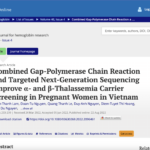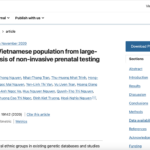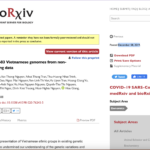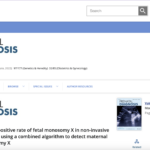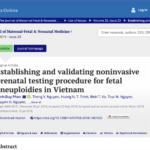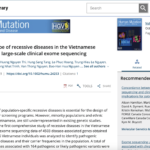Maternal Health Publications
- Combined Gap-Polymerase Chain Reaction and Targeted Next-Generation Sequencing Improve α- and β-Thalassemia Carrier Screening in Pregnant Women in Vietnam
Vietnam has a high thalassemia burden. We collected blood samples from 5880 pregnant Vietnamese women during prenatal health checks to assess thalassemia carrier frequency using combined gap-polymerase chain reaction (gap-PCR) and targeted next-generation sequencing (NGS).
- Detection of maternal carriers of common α-thalassemia deletions from cell-free DNA
α-Thalassemia is a common inherited blood disorder manifested mainly by the deletions of α-globin genes. In geographical areas with high carrier frequencies, screening of α-thalassemia carrier state is therefore of vital importance.
- Genetic profiling of Vietnamese population from large-scale genomic analysis of non-invasive prenatal testing data
The under-representation of several ethnic groups in existing genetic databases and studies have undermined our understanding of the genetic variations and associated traits or diseases in many populations.
- High prevalence of maternal mosaic monosomy X in pregnant women in Vietnam
To demonstrate the prevalence of maternal mosaic monosomy X (MMXO) in a cohort of pregnant women in Vietnam.
- Genetic profiling of 2,683 Vietnamese genomes from non-invasive prenatal testing data.
The under-representation of Vietnamese ethnic groups in existing genetic databases and studies have undermined our understanding of the genetic variations and associated traits or diseases in the population.
- Reducing false positive rate of fetal monosomy X in non-invasive prenatal testing using a combined algorithm to detect maternal mosaic monosomy X.
The false positive rate of detecting monosomy X by NIPT is higher than that of other autosomal aneuploidies, due in part to maternal mosaic monosomy X.
- Establishing and validating noninvasive prenatal testing procedure for fetal aneuploidies in Vietnam.
Noninvasive prenatal testing (NIPT) for fetal aneuploidies has been widely adopted in developed countries. Despite the sharp decrease in the cost of massively parallel sequencing, the technical know-how and skilled personnel are still one of the major limiting factors for applying this technology to NIPT in low-income settings.
- Genetic landscape of recessive diseases in the Vietnamese population from large-scale clinical exome sequencing
Accurate profiling of population-specific recessive diseases is essential for the design of cost-effective carrier screening programs. However, minority populations and ethnic groups, including Vietnamese, are still underrepresented in existing genetic studies.
